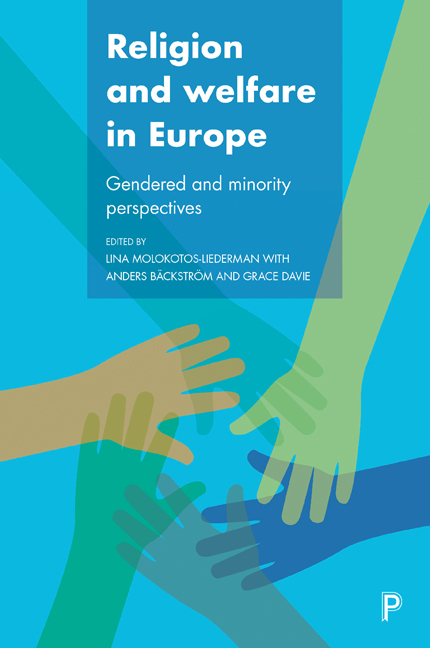Book contents
- Frontmatter
- Contents
- List of tables, figures and maps
- Acknowledgements
- Notes on contributors
- one Introduction
- Part One Thinking methodologically: approaches to research and practice
- Part Two Thinking regionally: key case studies in welfare and religion in Europe
- Part Three Gendered and minority perspectives
- Part Four Drawing the threads together
- Appendix: the WaVE team
- Index
Ten - Religion as a resource or as a source of exclusion? The case of Muslim women's shelters
Published online by Cambridge University Press: 05 April 2022
- Frontmatter
- Contents
- List of tables, figures and maps
- Acknowledgements
- Notes on contributors
- one Introduction
- Part One Thinking methodologically: approaches to research and practice
- Part Two Thinking regionally: key case studies in welfare and religion in Europe
- Part Three Gendered and minority perspectives
- Part Four Drawing the threads together
- Appendix: the WaVE team
- Index
Summary
Introduction
As part of the European Commission's 6th Framework programme, the Welfare and Values in Europe: Transition Related to Religion, Minorities and Gender (WaVE) project offers insights into the interaction of diverse value systems in local European settings and welfare regimes. In this context, this chapter presents an in-depth case study of a women's shelter in Sweden with a particular focus on Muslim women (including some references to Italy). The chapter also offers further insight into the complex relations between welfare, religion, gender, minorities and majorities.
As highlighted by the WaVE research on European welfare regimes, welfare systems quite clearly exist in various religious contexts, but there is nevertheless an enduring idea of the state as ultimately responsible for the provision of human care. This assumption, however, is increasingly matched by an expectation that both profit and non-profit actors within civil society will assume a complementary role to public care provision, not least for vulnerable groups such as asylum seekers, new immigrants and victims of human trafficking (Bäckström, 2011, 2012a, 2012b, 2014; Frisina and Cancellieri, 2012, p 233). Churches and religious organisations are among these actors, some of which engage in the care of female victims of domestic violence. For instance, the Catholic Church and its social arm Caritas provide support and shelter in both Italy (Frisina and Cancellieri, 2012, p 208) and Sweden. Another example is the Church of Sweden's diaconia institution Ersta Fristad.
In addition to religious organisations engaging in the care of abused women, there are secular organisations that are active within the field. Several such organisations have developed their own feminist theory and practice, together with expertise on violence against women at the intersection of gender, ethnicity and religion. Prominent examples are Trama di Terre, established in Italy in 1999, and Terrafem, established in Sweden in 2000. These organisations have a long experience in dealing with multiple forms of oppression of minoritised women and the difficulties of building alliances within a minefield of identity and migration politics (Patel, 1999, 2013). Common to these organisations is the fact that they offer counselling and protected housing to women from a variety of backgrounds, while also promoting their particular expertise in offering care to those who are categorised as ‘ethnic’, ‘immigrant’ or ‘minority’ women.
- Type
- Chapter
- Information
- Religion and Welfare in EuropeGendered and Minority Perspectives, pp. 207 - 234Publisher: Bristol University PressPrint publication year: 2017



